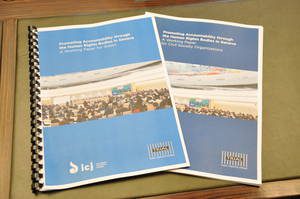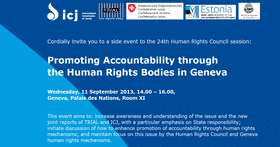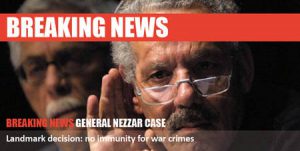For the first time ever, Bosnia and Herzegovina (BiH) has been condemned by an international human rights body concerning enforced disappearances committed during the war. The United Nations Human Rights Committee (HRC) found several violations of the International Covenant on Civil and Political
Rights (ICCPR) in regards to 5 Bosnian citizens from the Vogošća municipality who were forcibly disappeared in June 1992 after having been subjected to torture and forced labour in several concentration camps. TRIAL represented the victims’ relatives before the HRC and now calls on BiH to bring to justice those responsible for these crimes and to establish the fate and whereabouts of the victims without further delay.
Fate of victims of ethnic cleansing in Vogošća remain unknown 20 years later
Several waves of enforced disappearances and “ethnic cleansing” operations were perpetrated by the Bosnian Serb forces (Vojska Republike Srpske – VRS) during the war in BiH (1992-1995). The VRS burst into the village of Svrake on 4 May 1992, arrested almost all its inhabitants and took them to the Kasarna JNA detention camp in Semizovac. While most women and children were freed a few days later, the boys and men were kept prisoners and transferred to various concentration camps present in the region.
Fikret Prutina, Huso and Nedžad Zlatarac, Safet Kozica, and Salih Čekić were among the 850 prisoners of Svrake subjected to torture and forced labour in the concentration camps. The five men were last seen on 16 June 1992 in “Planjina kuca”, a detention camp located in the municipality of Vogošća. They are part of the 9’000 whose fate and whereabouts still remain unknown out of the 30’000 people who tragically disappeared during the war.
The families of Fikret Prutina, Huso and Nedžad Zlatarac, Safet Kozica, and Salih Čekić relentlessly tried to discover the truth regarding the fate and whereabouts of their loved ones.
“For over 20 years, we attempted in vain to see the authors of the disappearances of our husbands, fathers and sons prosecuted and sanctioned”, recalled Ema Čekić, wife of Salih Čekić and President of the Association of Relatives of Missing Persons from Vogošća.
In 2009, twelve relatives of the victims – including the wives, siblings, sons and daughters of the five disappeared men, all members of the Association – decided to refer their cases to the UN Human Rights Committee. TRIAL represented them throughout the proceedings.
Gross violations condemned by the UN Human Rights Committee
In a decision just made public, the HRC found BiH responsible for several violations of the ICCPR for its failure to properly investigate the disappearance of Fikret Prutina, Huso and Nedžad Zlatarac, Safet Kozica, and Salih Čekić and to bring their perpetrators to justice. In particular, it found that the relatives of the five men were further victimized because they were forced to have their loved ones declared dead in order to have access to social allowances, while their fate and whereabouts were in reality still unknown. Moreover, two of the victims’ relatives were minor when they witnessed the enforced disappearance of their fathers. BiH failed to adopt the special measures of protection required by their young age.
The HRC urged BiH to provide justice and redress to the victims of these crimes. In particular, it recommended BiH to strengthen the ongoing efforts to establish the fate and whereabouts of the five disappeared men and to bring their perpetrators to justice by the end of 2015, to abolish the obligation for family members to declare their missing relatives dead in order to benefit from social allowances, to grant an adequate compensation to the 12 relatives and to guarantee that investigations into allegations of enforced disappearances are accessible to the families of victims.
A landmark decision giving hope for the future
TRIAL welcomes this historical decision in the hope that it will incite BiH authorities to rapidly uncover the truth on the fate of the victims and render justice to their relatives.
“This decision is a positive signal for the thousands of other relatives of disappeared persons throughout BiH that are in the same situation of anguish and uncertainty as the applicants in this case”, said Lejla Mamut, TRIAL Human Rights Coordinator in BiH.
TRIAL calls upon BiH, which now has six months to inform the HRC of the actions taken to enforce the decision, to implement the recommendations set out by the UN body. BiH should also publish the HRC decision and widely disseminate it in the three official languages. “TRIAL will closely monitor the enforcement of the decision to ensure that the victims’ rights and dignity are restored”, added Ms. Mamut.
“The path leading to justice for the victims is long in BiH, but the HRC decision gives us hope for the dozens of other cases of enforced disappearances currently pending before the Human Rights Committee and the European Court of Human Rights submitted by TRIAL”, concluded TRIAL directorPhilip Grant.
For more information
Read the views of the HRC on the Prutina, Zlatarac, Kozica and Čekić cases
Read the summaries of the Prutina, Zlatarac, Kozica and Čekić cases on TRIAL’s website


 What are the potentials of Geneva-based human rights bodies in the fight against impunity? How can these bodies better promote the liability of individuals and of States responsible for crimes under international law and gross human rights violations?.
What are the potentials of Geneva-based human rights bodies in the fight against impunity? How can these bodies better promote the liability of individuals and of States responsible for crimes under international law and gross human rights violations?.
 The arrest and disappearance of Djaafar Sahbi took place in the context of thousands of other enforced disappearances of Algerian citizens who were in the hands of the army or State agents during the civil war in Algeria between 1992 and 2002. Employed at the Mustapha Bacha Hospital in Alger, married and father of two children, Mr. Sahbi was arrested by the police in July 1995 and hasn’t been seen by his family members ever since. A few days after his arrest, the police entered by force in his house and seized a number of documents including his “livret de famille”. Since then, Mr. Sahbi’s relatives seized all the competent authorities to clarify the fate of the disappeared, but without success. Despite the constant efforts of the family, the Algerian authorities have not provided them with any information about the disappeared’s fate and did not conduct any effective investigation into his disappearance. No charges were brought against the alleged perpetrators.
The arrest and disappearance of Djaafar Sahbi took place in the context of thousands of other enforced disappearances of Algerian citizens who were in the hands of the army or State agents during the civil war in Algeria between 1992 and 2002. Employed at the Mustapha Bacha Hospital in Alger, married and father of two children, Mr. Sahbi was arrested by the police in July 1995 and hasn’t been seen by his family members ever since. A few days after his arrest, the police entered by force in his house and seized a number of documents including his “livret de famille”. Since then, Mr. Sahbi’s relatives seized all the competent authorities to clarify the fate of the disappeared, but without success. Despite the constant efforts of the family, the Algerian authorities have not provided them with any information about the disappeared’s fate and did not conduct any effective investigation into his disappearance. No charges were brought against the alleged perpetrators.